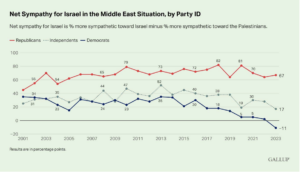Israeli Prime Minister Benjamin Netanyahu dissolved the country’s War Cabinet on Monday, a week after his longtime political rival, Benny Gantz, left the wartime unity government.
A spokesman for the prime minister told the press that there was “no more need for an extra branch of government.”
The move comes more than 9 months after Hamas launched an invasion of Israeli territory on October 7th, which killed more than 1,200 people – mostly civilians. More than 240 more were taken hostage by terror group Hamas. More than 100 of those hostages have since been released or recovered, but according to the Israeli government as many as 116 are still in Hamas’s custody – including some who are presumed dead.
Gantz, a former IDF general who served as the country’s defense minister from 2020-2022, has been one of Netanyahu’s chief electoral opponents for the better part of a decade, but his party joined Netanyahu’s coalition in a display of national solidarity after the October 7th attack.
However, he and his allies have clashed with other members of Netanyahu’s government on how to best prosecute the war in ongoing war in Gaza – disputes over hostage negotiations, a potential ceasefire, the future of a post-war Gaza and the influence of more hardline elements of Netanyahu’s multi-party coalition had been lingering sources of tension months before the official split. He and Gadi Eisenkot, a former IDF Chief-of-Staff and a member of Gantz’s National Unity Party, left the cabinet on June 9.
Even after the defection of the National Unity Party, Netanyahu’s government retains a four-seat majority in the Knesset – the Israeli Parliament – although the loss of support limits his room to maneuver between the competing interests of his coalition which currently contains members from six parties. 
Gantz is seen by many as the man most likely to replace Netanayhu as prime minister – although recent polls suggest that his party’s electoral edge is narrowing – and even met with top U.S. officials in March to discuss humanitarian efforts in Gaza and a potential end to the war. That visit was not authorized by the Israeli government and reportedly drew a harsh rebuke from Netanyahu, who, according to the Associated Press, told Gantz that Israel has “just one prime minister.”
The Israeli government has been under considerable pressure, both domestic and international, since the war began. Before the war began, Israel was sharply divided over judicial reforms championed by Netanyahu – support for his government declined considerably and thousands of left-wing activists took to the streets of Israel to protest the decision throughout much of 2023. Those protests were essentially put on pause after the start of the war, but the dissolution of the war cabinet could signal an end to the political ceasefire and a renewal of mass anti-government demonstrations.
On Netanyahu’s right flank, elements of his coalition have argued that the current government has not been aggressive enough, and have castigated Israel’s humanitarian pauses and provision of aid to Gaza as “delusional.”
“The manner in which the humanitarian effort in the Gaza Strip is being managed, in the framework of which aid goes largely to Hamas and helps it to retain civilian control of the Strip in direct contradiction to the goals of the war, has been bad throughout the last few months,” Finance Minister Bezalel Smotrich said. “This is one of the reasons for the continuation of the war.”
National Security Minister Itamar Ben-Gvir, who repeatedly clashed with Gantz and has long sought more influence over military matters, has already called for an escalation of the war effort in the north.
Hezbollah, an Iranian proxy group that controls much of southern Lebanon and has been intermittently firing missiles, and other artillery into northern Israel in support of Gaza.
“Israel is in an unacceptable situation, in which a big part of the country has been deserted,” Brigadier. General Efraim Sneh told the Washington Post. “Israel’s forces are stretched thin between Gaza and the Lebanese border.”
“Hundreds of rockets cannot be answered with surgical actions,” Ben-Gvir said last Wednesday, claiming that Netanyahi was “out of excuses” for avoiding all out war after Hezbollah fired 215 missiles into Israel. “You are the prime minister, and you cannot even hide behind Gantz and Eisenkot anymore.”
Smotrich and Ben-Gvir were part of the broader security cabinet but had been excluded from the higher level War Cabinet, to their consternation. Gantz was reportedly irritated by the influence they did have over policy and that was one of the major fissure points between him and Netanyahu. Going forward both men are likely to have more say in a smaller, more right-wing governing bloc.

Photo by Gallup
While a majority of Americans continue to support Israel, a growing number of Democrats, particularly younger Democrats, are more sympathetic to the Palestinian side, with some college protesters openly lionizing Hamas and celebrating the death of Israeli civilians. The war has become a major wedge issue on the American Left and President Biden has attempted to walk a political tightrope of supporting Israel while simultaneously constraining their war effort.
Biden has openly voiced opposition to Israeli operations in Rafah, a city in southern Gaza where more than a million refugees have fled since the war began, and Hamas’ last major stronghold. In March the president threatened to withhold military aid to Israel and he has continually pressured them to negotiate a ceasefire with Hamas’ leadership, even prematurely announcing a deal.
Other countries and international organizations have been even less supportive – last month Spain, Ireland and Norway officially recognized the existence of a Palestinian state, while the International Criminal Court (which has no jurisdiction in Israel or the United States) issued arrest warrants for Prime Minister Netanyahu and Israeli Defense Minister Yoav Gallant.
“I hope [Ireland’s recognition of their state] sends the Palestinian people a message of hope that — in this their darkest hour — Ireland stands with them,” Irish Prime Minister Simon Harris said to members of Ireland’s parliament. “It is no longer enough just to condemn. It is no longer enough just to be repulsed. We must be on the right side of history.”
These decisions came shortly after the United Nations reduced its estimate of civilian casualties by nearly 50%. Previous data had been collected by the Gaza Health Ministry, which is controlled by Hamas and was accused of grossly inflating the death toll. By most historical standards, the civilian:combatant death ratio in Gaza is unusually low(between 2:1 and 1:1) despite the fact that Hamas deliberately hides its forces behind civilians.
On Monday the Israeli military told ABC that they currently control about 60% of Rafah, and that the main portion of their military operation there should wrap up within “a few weeks.”
“We are there to dismantle the military framework of the [Hamas’] Rafah Brigade,” Rear Admiral Daniel Hagari, a spokesperson for the IDF, told the outlet. “We are weeks now just from achieving this goal.”



Post a Comment